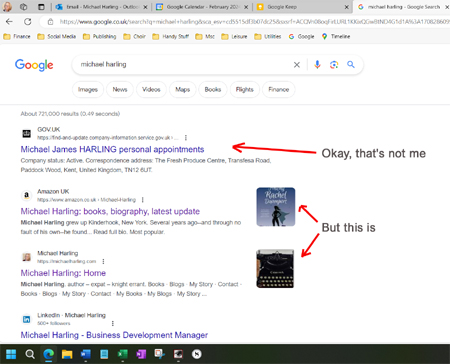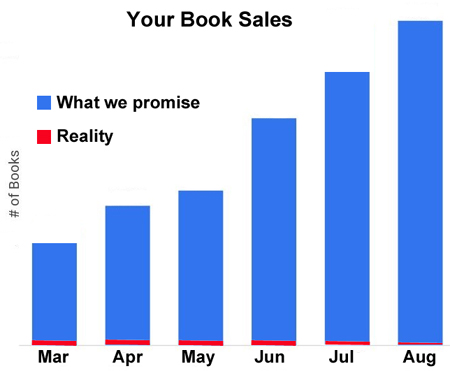-
Lessons in Marketing
What I know about marketing you can fit into a thimble with room left over for a shot of whisky. Well, maybe a half-shot; it is a thimble after all. But my point is, I know very little about marketing.
However, my experience with the covers impressed upon me that, if I didn’t have the talent to do something, there was always someone out there who I could pay to do it right. And my one advantage over many other Do-It-Yourself authors is a disposable income. And so, with hope in my heart and a certain sum in mind, I searched for book marketers.
I was not disappointed. There is no end of businesses out there willing to take your money in exchange for dubious marketing advice. The first one that came up was Amazon, and I figured, since they are the main enabler of self-publishing authors, they might be the best people to help with marketing. Trouble was, their site didn’t offer much in the way of details, such as price.

Just a sample of the people willing, and eager, to take my money. What their site did offer was a nagging “ping” that kept urging me to chat with them about my needs so they could match a marketing strategy to it. So, I finally gave in and soon found myself on the phone with my new best friend, Jim.
He asked if I had a website, and I assured him I did, so he asked for the URL and told me to look at it with him.
“What do you see there?” he asked.
“The Lindenwald logo.”
“Exactly,” he said. “Do you see any books?”
“Now look at this author’s site.”
I went to the URL and suddenly felt like Paul on the road to Damascus. What I had made was all wrong, and now I knew how to fix it.
“What you need,” my new best friend Jim told me, “is a URL of your book title.”
Actually, I thought, I don’t. Having a URL for each book would be A) expensive, B) stupid, and C) not at all what I wanted. But the website was a revelation. By now, I’m taking notes.
“Now Google that author’s name.”
I did.
“What do you see?”
“His books on Amazon, and his website, at the top of the list.”
“Okay, now Google your name,” Jim said, with just a touch of smugness. “What do you see?”
“My books on Amazon, and my website, at the top of the list.”
This took him aback; I don’t think he was expecting that.

“Wait a minute! You’re supposed to pay us to make that happen!” “Um, well, what else we can do for you is …”
But I was busy taking notes, and barely heard him tell me about how they would write a Press Release and send it to a myriad of news outlets. To emphasize, or impress, he sent a list that did, indeed, include all the major news outlets. But all I could think was, “I can do that, and I would, if I thought it would make a blind bit of difference.”
Then he promised to list my book (still ignoring the fact that I wanted to publicize the series) with all major book sellers—Waterstones, Barnes and Noble, etc.—and I stopped him (which wasn’t easy; he was on a roll) to remind him that these were self-published books. He said he was aware of that, and it was then I realized he wasn’t a marketer outlining a proposed strategy, but simply a salesman, because listing my books with all those outlets was not something I could do, but neither could they.

Your basic marketing plan. He then went on to complete the list of ten or twelve things they would do for me, some of which I knew were impossible, others that were dubious, and a few that were good ideas, but things I could do myself, for free.
When he finally finished, I asked the important question: how much? The answer was: $5,000.
I assured him that was well north of what I was willing to pay, so he said, “Oh, that’s the price we charge stupid people. You don’t seem to be that gullible, so I’ll knock 40% off.” Well, that’s what he meant, but what he really said was it was some sort of one-time only deal. But the bottom line was $3,000. So, I told him that was too much as well. “But if you’re over fifty,” he went on, pretty sure that I was, “we can bring that down another 15%.”
I again assured him what I was willing to pay wasn’t even in the same ballpark, so he switched tack—appealing to my non-existent greed and naivety—by reminding me of all the time and effort I’d put into my book, and insisting I should want to give it the best chance of success. But I was doing some calculating of my own, and realized I’d have to sell 15,000 books just to break even.

“Don’t be an idiot. You can make back that money! You’ll be the next Stephen King if you pay us enough.” I again assured him that we were not going to find common ground, and told him I had already gotten some great ideas off him for free (but he gave me the ideas before I gave him any money; that’s bad business—I didn’t say that to him, of course). I was halfway through apologizing to him for wasting his time when he hung up on me.
So, I guess my new best friend Jim is now my new ex-best friend Jim. But at least I got a decent website out of it. That alone was worth the phone call.
